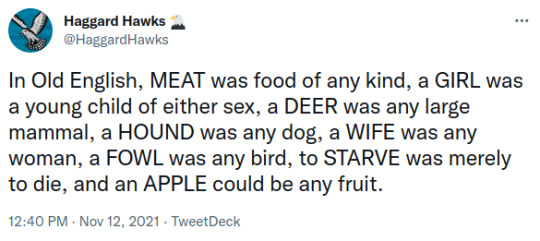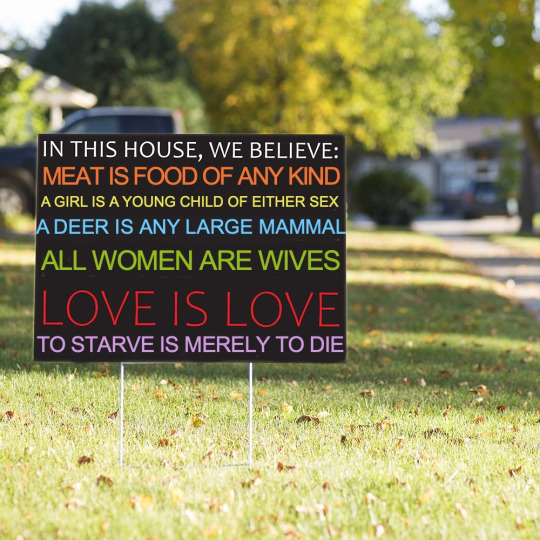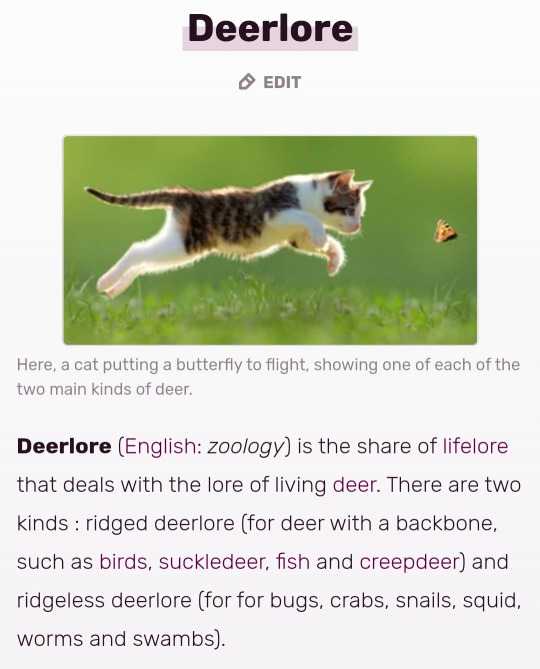#anglish
Text
look, I know I've talked about this essay (?) before but like,
If you ever needed a good demonstration of the quote "Any sufficiently advanced technology is indistinguishable from magic", have I got an exercise for you.
Somebody made a small article explaining the basics of atomic theory but it's written in Anglish. Anglish is basically a made-up version of English where they remove any elements (words, prefixes, etc) that were originally borrowed from romance languages like french and latin, as well as greek and other foreign loanwords, keeping only those of germanic origin.
What happens is an english which is for the most part intelligible, but since a lot everyday english, and especially the scientific vocabulary, has has heavy latin and greek influence, they have to make up new words from the existing germanic-english vocabulary. For me it kind of reads super viking-ey.
Anyway when you read this article on atomic theory, in Anglish called Uncleftish Beholding, you get this text which kind of reads like a fantasy novel. Like in my mind it feels like it recontextualizes advanced scientific concepts to explain it to a viking audience from ancient times.
Even though you're familiar with the scientific ideas, because it bypasses the normal language we use for these concepts, you get a chance to examine these ideas as if you were a visitor from another civilization - and guess what, it does feel like it's about magic. It has a mythical quality to it, like it feels like a book about magic written during viking times. For me this has the same vibe as reading deep magic lore from a Robert Jordan book.
#off topic#literature#language#linguistics#science#science history#science fiction#fantasy#physics#atomic theory#anglish#chemistry#robert jordan#the wheel of time#uncleftish beholding
42K notes
·
View notes
Text




#anglish#deer#english#latin#old english#sorry in advance to aline if this is innacurate in the way pop linguistics often is
48K notes
·
View notes
Text

Anglish, to me, sounds super similar to the way goblins speak in FF14.
#ff14 ffxiv#ff14#final fantasy 14#final fantasy 14 goblins#anglish#im still in heavensward please no spoilers
42 notes
·
View notes
Text
today i just found out about Anglish.
that made me think... what if Indonesian without any European influences?
no words from Portuguese, Dutch, English, etc.
bahasa Nusantara?
i think it would be hard, seeing that the Netherlands invaded the country for 3 centuries or so.
theres a whole wikipedia list of loanwords from Dutch qwq
35 notes
·
View notes
Text
Today's Anglish word:
nameknown
adjective
Famous; widely recognized.
#english language#anglish#old english#linguistics#entymology#germanic languages#romance languages#neologisms
2 notes
·
View notes
Text
Thoughtline Ereknack
Thoughtline ereknack is a termen I begot to name a forset that showed up in my mind after diving in Ununderstandenliness. Folk, even if before having any skinship with an outhwitly thought, would have a ereknack to follow a sicker knowingness path, they would already have a kindful leaning to see full ground in sicker things, and not cun to see ground in others. This is, however, **not** the same thing as thoughtache or thoughtline tilt, as these are about withfiddling, wrench that one nethermindly or unnethermindly makes to not underfang that his thought may or is wrong.
Overkindlorely and outhwitly askings is in truth more retching than seeing of sooth: even if they are knitty and deep, they don't give us an ending answer, which tells, with no tween, sooth, but rather give us only clues;
Forthen, we are left with only strouts, which, tweenly leads us somewhither;
It's not sheerly the strouts that make folk to onnim an outhwitly belief over another, forwhy, if so, the strouts of the unonnimed belief would be retching things in a less thorough way, which is not true, when we learn things billwhitely; they are evening in suttlings. In truth, since there are good sights from both sides, if sheerly through strouts, one should onnim no belief, since it's groundlessly to choose one as right, while the other is even in "might". One should instead onnim belieflessness;
Therefore there must be something other than strouts that make folk to onnim a belief over another, and this thing is the thoughtline ereknack, a tilt, a kindful thoughtworking that shaped one's anyet so he can see ground only in one of those witcrafts.
I'm not sure that thougtline ereknack can make a head uncun to believe something in which he is not ereknackened to see ground. Even if I believe it's uneath, and likely not in all happenings, but in the great, I think it is, yes, comenly that a head ends up changing from the ereknackened belief to an unereknackened one, or even choosing an unereknackened belief right away.
2 notes
·
View notes
Text
me: i don't think im neurodivergent
also me: Let's reread the anglish wiki about archaic case and gender for the 827900342586636th time!
(this is the article im talking about:
)
3 notes
·
View notes
Text
Obviously this is a story that's going to take me a lot of time since so much research has to go to every single word, but if anybody is curious and wants to take a look at it or read along I will be posting it here with footnotes to define or explain my word choices.
Untitled 8 Readalong
Comments and questions are welcome!
8 notes
·
View notes
Text
to clarify, my 'anglish' type conlang would allow as many loanwords as other Germanic languages have
I'm not gonna be dumb and get rid of stuff like "algebra" which is a foreign concept anyway, but stuff from french or latin that was inkhorned in later and replaced perfectly good english stuff doesn't need to stay lol
4 notes
·
View notes
Text
fantasy book written in anglish. is this anything
4 notes
·
View notes
Note
Have you ever read anything about Anglish? It's basically an Anglo-Saxon version of modern English, with all foreign loan words from Latin, Greek, Norman etc removed.
I read it, and immediately thought of your Lord of the Rings stories. Your characters reflect on language quite a lot, and you strike me as someone who aims to use 'authentic' words, especially with respect to Rohan. For example, you refer to the gathering of the nobles as a witan, because the former is from Old English, so is far more fitting than a Latin-origin word such as council.
Can you imagine, how interesting (and how stressful) it would be to write a whole Rohan-based fic in Anglish instead of English? Purely for academic / historic / language nerd shits and giggles, if nothing else...
I've read a little about Anglish! and I've noodled around on the wikipedia for it a bit. I mean, it's an entertaining thing to play with, outside the fact that no language has ever existed without external influences. It's not a thing (also the xenophobic history of "language purism" is not great, to say the least. I know Jennings, who coined the term, was a humorist but the history of the idea of Anglish is long and has some questionable ideas in its past).
But yeah, for my stories I tried to use words that would best reflect that institutions or things the characters were talking about. I think I was less going for "authentic" words than seeking the words that best fit the item being discussed.
For Witan, sure I could have used "council," but when we say council or king's council that conjures a specific idea in the modern reader's mind. We have specific associations with it and Witans served a purpose outside of what we think of a king's council. It was more than that, in Anglo-Saxon England, both in pre and post-Christian times. Assembly could work, but that implies more of a parliamentary or public-rule than was the case. Witans were also the space where specific legal issues had to be resolved, rather than through other legal channels.
Trying to pin down the exact nature of witans is hard, historically, as we have little extant evidence of the details of their workings. They seemed rather fluid and could be shaped by the king/local ruler to suit the needs of that specific moment. From bearing witness to land grants to collectively determining new laws to judging on legal cases, and even deciding who was to be king (during the Heptarchy), among other things.
Council has a more static, structured association, and a more court-based one rather than a liminal, fluid thing that could happen yes, in Edoras, but also elsehwere in Rohan, as required.
So when Grima is overseeing the Witan has law-speaker, he could be doing any number of activities and the role he would have played would have shifted depending on the needs of that time.
It's all very nebulous while, at the same time, providing structure and a specific sort of court-of-law/notary/witness system (vitally important in a proto-literate world where the spoken word was king).
So yeah, my thought is that given the size of Rohan, there would be more fluid assemblies to deal with legal issues, among other things, and those would be called by the local leaders/the king and the "master of ceremonies" of sorts would be the law-speaker, or whoever was subbing in on that role. These assemblies would be yearly or biannual and would need to be flexible and reactive to fit the needs of the people or the situation. Council nor assembly serve that purpose. Witan does.
--
Anyway, all this to say, it would be hilarious and insanity inducing to try and write a Rohan fic in Anglish. Grima would approve, though, of this exercise simply from a wordplay perpective. (Tolkien, though, would likely think it all bunk. )
Add in the creative spelling of times past and we're good to go. ;)
#ask#reply#grima would thrive on this sort of challenge#LOTR#lord of the rings#anglish#language#swimming through fire
5 notes
·
View notes
Text
I am having so much fun with Anglish
Some movie titles in Anglish:
The Maned Cat King
Star Wyes: The Kingdom Strikes Back
Smiters: Forever Wyes
Hushing of the Lamb
Spider-man: Into the Spider-World
Toy Tale
Townsman Kane
3 notes
·
View notes
Text
real quick is anglish racist
5 notes
·
View notes
Text
Today's Anglish word:
glaremight
noun
Electricity.
#anglish#old english#linguistics#english language#english history#english#neologisms#romance languages#germanic languages#entymology
0 notes
Text
Every belief is a trow
It doesn't dow how overwon is a head about something, how overween he is with the rowground that he has chosen leads to a sundry ending, in the end of the day, he, in truth, cannot asoothe that his belief - which here is not only lief, but ofondly anything that one believes -, is indeed the truth, indeed the retching of sooth. In the same way that the head who thinks the thwirely, here going for one thought as knotty as, as evenly overween, cannot in truth asoothe either that the other head is wrong, or his own thought is right. And in the end that is it: we con and con on an antimber, find sere knotty strouts and begettings, which so well retch sooth, which are so witcrafty, but that's all, they don't lead us to an endly upshot; they do finger to an airt, but are not enough for us to say without any tween. Therefore every belief is a trow, for we believe something without even having a seething that it is true.
In sid, it's almost if, even if with all strouts, we are left in the same site whither we started: in tween, with the only shed that we have a comenly answer. But it's gripping how we don't get crazy with this sussel, the trey of trying so hard, forwhy our belief for our thanks is such, that we reach a prick where we truly feel like we've reach the utter ending, the truth, and indeed there are folk like that, but it's something that, and the one who has undergot our mightless of knowing will know, is dwimmery, for, in sid, there is no wissness. Once this unwissness shows up in one's head, it doesn't go away anymore, the full sickerhood to seethe something is soothe doesn't go along with us anymore, for there's no way to asoothe, which leaves comendliness alive for, even if one's trow is strong enough to make its rine very small, another belief being the afforder of the retching for sooth.
(This thought of mine isn't brookenly for anything, it is brookenly always for things whose endings, outcomes we can't witness; that is, for overkindlorely and eldritch askings, which seek to retch the working and staddles of sooth.)
Wanting a name for this shape beknowing we have no wissness, I begot "Soothknowingless", or "Outhwitly Fraindom (the latter word being an own Anglishening for 'Skepticism'". Happily, there's already a word for this thinking. It's not a ferly that my thoughts and swenches were already felt by someone else, who begot a name for that. The word is "Acatalepsy", which I Anglishened to Ununderstandenliness.
When I undergot this understanding, another alike thought came up, which says we have a Thoughtline Ereknack.
5 notes
·
View notes
Text
The Tale of Loftborough
Trying a little creative writing exercise. I can't remember the last time I did any non-technical writing, so this was something new for me.
-There's a gimmick/constraint I'm working with - the word choices (and the tag, but don't look until the end!) should give away what it is.
-This is not wholly original - it's an attempt to write a backstory for an existing work by a certain well-known creator.
--------------------------------------------------------------
Our tale begins by a hamlet of yore, in a hollow where the townsfolk dug deep for iron ore. A man saw a spark, something bright in the dark, a blue glow of wellspring unknown. His brethren sheared out the rubble and unearthed the stone, when it rose to the air, aloft on its own. They brought it to town, showing all what they found, where the townsfolk were awed by this gem of strength unbound. Aeledstone made even the heaviest things featherlight beyond any kindlore known.
The fathomless strength of aeled was tamed by caretakers and shared alike, bringing happiness, gleaming, glowing, to most, following a weirding tale by a man who once said, “Share land and godmade wonders – keep all else made by one’s own hand.”
All the townsfolk put this witching to work, making wondrous tools and crafts of all sorts. Biggest of all was the sky island—a means of lifting whole towns upward. They crafted a great heart of aeledstone and buried it deep within the king’s stronghold, linking it to stour spinning blades beneath the settling itself. And so Loftborough was born, a whole fleet of skybound buildings which followed fair weather, good trade, and wealth.
But though the sky islands were Loftborough’s biggest craft, its greatest was another. Hewn from ruddy tinbrass and iron, from the teamwork of lodesmiths and witcrafters, were the Wroughtminds. In vast bloomeries, the lodesmiths first shaped ore into folklike beings. Then the witcrafters breathed soul into them with carefully cut aeledstone, inbedded into their hearts. Awakened hence, the Wroughtminds befriended and bestood all the Loftfolk in their strivings.
Endless lightwork, borne from the Earth, lifting townsfolk to the heavens above — in time, few remembered the old world of dearth.
But a time came when that wondrous flowing ran drier and drier. The shimmer of aeledstone dimmed from the old orehollows, day by day. The folk of Loftborough carved and cut through the earth, creeping and seeking hollows yet untouched, grasping anywhere to find more of the blessed stone. As gemhoards dwindled and the drought worsened, crafts and crops alike began to wither, and barren times began to grip the towns of Loftborough.
In time, the anger of wantsome folk spilled over, first to squabbling, and then to fighting. Their kinship ended, some folk of the floating towns forsook their islands, coming home to mother Earth, leaving their old homes behind, emptied, frozen in time. Others met more bitter ends, wielding frightful aeledborne weapons against one another, firing floods of blinding, searing, skyborne glimmer, until each island crumbled and crashed to the ground. Torn apart by their greed, the kinship of Loftborough was left scattered, broken, and dead.
One island was left, but its townsfolk had long gone, leaving behind a waning flock of Wroughtminds. They worked on through the end of their crafters—in time, all but one would shut down. The last of them was the gardener’s helper, a rugged yet friendly old soul. But the Wroughtgardener was not distraught, for he always believed his friend would come back someday. Besides—there was much to do at home, he thought. The songbirds were hatching, the sunblooms were sprouting, and the gate needed another dusting.
The world of Loftborough became but a dream, forgotten to all but a few elders. The kingly kinfolk of Loftborough kept but one token of their yore—a dearworthy aeledstone hanging from a string, inbedded with spells of many yesteryears. Truths became stories, and stories became folklore. Only one tale of old lived on among Loftborough’s kingkin, a tale told something like so:
“Swirling and swirling amidst the churn, a beacon stands bright, its gaze true and stern. Casting a light beyond angry storms, beyond bitter seas, across the bight to burn. Godborne dreams of dawns anew, to the ends of Earth they swiftly flew. Loftborough awaits—speak the right words, and make haste. Wend your way by this stone’s glistening hew; come forth, come hither, and bring frith to the lost kingdom anew.”
0 notes